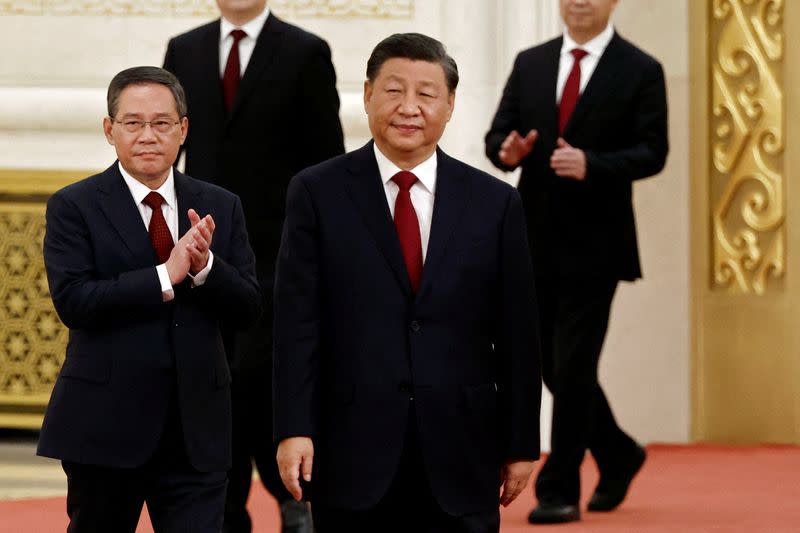Investors and economists have had mixed feelings about China’s pledges to support the economy at a key Politburo meeting this week because they offered little detail on specific measures.
Economists are underwhelmed partly because the goal of growing at about 5% this year was seen as easy to reach due to favourable base effects after one of China’s worst years in half a century.
And that level looks less impressive given China invests about 40% of its GDP per year – twice what the United States invests.
After a strong start of the year following the removal of Covid restrictions, the world’s second largest economy barely grew in April-June, sparking worries it may be entering a new era of much slower growth and even Japan-like “lost decades” of stagnation.
ALSO SEE: China Confirms Pan Gongsheng as New Central Bank Chief
The main worry is the slowdown is more structural than cyclical and requires significant political will to change course on policies that have proven extremely successful for decades but now generate more debt than growth.
Accounting for about a quarter of economic activity, the overextended property sector can no longer act as a key driver of growth, but allowing the bubble to deflate rapidly could destabilise the financial sector and the real economy.
‘City-based’ response to property crisis
The Politburo removed a key phrase from the readout of its meeting in April, that cited President Xi Jinping as saying “houses are for living, not for speculation,” sparking a rally in the shares of battered property firms.
While markets are expecting further easing of property market regulations to slow the giant sector’s downturn, the Politburo flagged a “city-based” approach rather than nationwide changes.
A call for “more affordable” housing suggests state-led investment into new projects, some analysts said.
Plans to boost household consumption disappoint
Another long-standing structural imbalance is China’s household consumption, which remains among the smallest contributors to GDP in the world. Fixing it, economists say, requires transfers to the household sector.
Options include government-funded consumer vouchers, significant tax cuts, encouraging faster wage growth, building a social safety net with higher pensions, unemployment benefits, with better and more widely available public services.
No such steps were flagged.
The Politburo reiterated that it wants to turn household consumption into a key driver of growth. It flagged its intention to boost consumption of autos, electronic products and household goods and promote tourism, sports, entertainment and culture.
Remarks about the importance of the private sector were encouraging, but economists were underwhelmed that the general proposals on how to boost consumption seemed nothing more than further plans to subsidise the autos and electronic appliances industries.
There was no mention of consumption vouchers or other direct measures that would immediately boost household income, leaving many economists disappointed that plans to lift demand consist of subsidising manufacturers instead of consumers.
‘Basket of plans’ to resolve local government debt
Meanwhile, the Politburo said China will formulate “a basket of plans” to resolve risks stemming from local government debt, which economists estimate at more than $9 trillion.
This line was seen as more constructive than April meeting’s pledge to “adamantly curb any new hidden debts.”
Investors in China have been looking for more clarity on Beijing’s plans to address local government financing issues since the property market bubble burst in 2021 and many cities’ key source of revenue – land auctions – took a major hit.
The readout was welcomed by economists, but the urgency of the situation left analysts wanting for more concrete details.
Economists’ proposals range from debt-for-equity swaps, to a soft “extend-and-pretend” restructuring by refinancing loans at lower rates and with longer maturities, to Beijing bailouts.
An official strategy would go a long way easing market nerves.
The solution could require the national government in Beijing, which has spent decades centralising power, to transfer resources to cities and provinces and take on some of their debts.
Concern about sluggish job market
Another headache for the Communist Party is youth unemployment surpassing 20%. The promise of prosperity has encouraged younger generations to study for advanced economy jobs, rather than the lower-end work available in the industrial and services sectors.
The Politburo said efforts should be taken to “stabilize employment from a strategic perspective,” signalling Chinese leaders are concerned that a sluggish job market poses social instability risks.
Policymakers want the private sector to regain confidence and start investing, thus creating jobs for the more than 20% of youth seeking employment.
The onus is on the private sector to provide those jobs, but many businesses lack confidence after years of crackdowns on the tech, financial and other sectors.
Levelling the playing field between the private and state sectors ultimately requires rule of law, analysts say. However, Chinese courts answer to the Communist Party.
Economists weren’t expecting discussion of any radical shifts but looked for signs Chinese leaders were acknowledging the enormity of the task ahead and clues on their longer-term thinking, and more details about what is in the pipeline for the near-term.
The top leaders simply gave a nod to industries that have been bleeding jobs in recent years and are particularly attractive to university graduates, from artificial intelligence to the platform economy and advanced manufacturing.
Any investor expecting big-bang spending in response to weak growth this year would have been unimpressed.
Various government agencies will now need to turn the Politburo’s policy direction into reality, and announce specific measures in coming weeks and months.
That is what markets will look for to determine how well China is managing the risks it faces. In particular, investors are keen to see the package of measures on the property sector and on local government debt.
More profound structural reforms will have to wait until a key Party conference in December.
- Reuters with additional editing by Jim Pollard
ALSO SEE:
Cool Reception for China Moves to Lift Sales of Cars, Electronics
Beijing’s Crackdown Wiped $1.1 Trillion Off Chinese Big Tech
China’s Property Sector Will Remain Weak For Years: Goldman
























